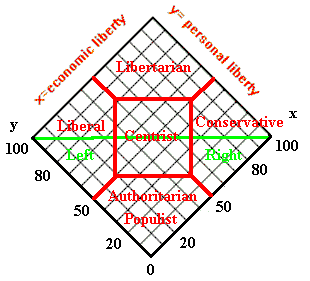
I thought I’d post a Nolan Chart today to demonstrate what being a libertarian means. This particular version is from The Proceedings of the Friesian School by Kelley L. Ross, one of my favorite sites on philosophy. Other versions exist, for example, the one used on Wikipedia to illustrate its article on the subject. You’d do well to read Ross’ article on the subject, but to summarize, the Nolan Chart appears to have been inspired by Ayn Rand’s observation that the political right and the political left both allow individual freedom in the areas that they think aren’t important but invoke government intervention in areas that they think are important.
To the political right in the U.S. who are often strongly religious, the area that is important is personal morality. After all, to the religious, material wealth isn’t something that you can take with you to the afterlife and anyway, God helps those who help themselves, so it makes perfect sense that those who work hard are materially rewarded. Sin however is seen as a permanent stain on the soul and perhaps even a corrupting influence that can spread unless it is stamped out, and is therefore much too important to be left to the individual.
As for the political left, who are much less preoccupied with the hereafter, the proper role of government is to strive towards social justice in the here and now. The left often sees society as something that is perfectible by man in order to create a utopia on Earth, an ideal that the religiously-minded right would find abhorrent. Since the left does see material wealth as a fundamental measure of social justice, wealth inequality is something that must be fought against and this naturally means that the question of how wealth should be distributed isn’t something that can be left to individuals but should instead be determined by society, i.e. the government.
Libertarians, of course, believe in freedoms along both the personal morality and economic rights axes. To libertarians, nothing justifies government intervention in the personal lives of its citizens. The proper role of government is limited strictly to mediating between citizens when there are disputes between them but consensual transactions between voluntary citizens are nobody’s business but their own. Libertarians believe that governments are necessary to society, a point which differentiates libertarians from anarchists, but sees them as a necessary evil that must be kept as small and as limited as possible, lest it becomes a tyranny. For me, there is no greater evil than the evil perpetrated by a government in the name of the greater good of its citizens. As C.S. Lewis wrote:
Of all tyrannies, a tyranny exercised for the good of its victims may be the most oppressive. It may be better to live under robber barons than under omnipotent moral busybodies. The robber baron’s cruelty may sometimes sleep, his cupidity may at some point be satiated; but those who torment us for our own good will torment us without end, for they do so with the approval of their own conscience.
This is one of the most interesting things I’ve ever read; I shall have to look for more information regarding this Libertarianism. The C.S. Lewis quote was a nice touch – quite thought provoking!